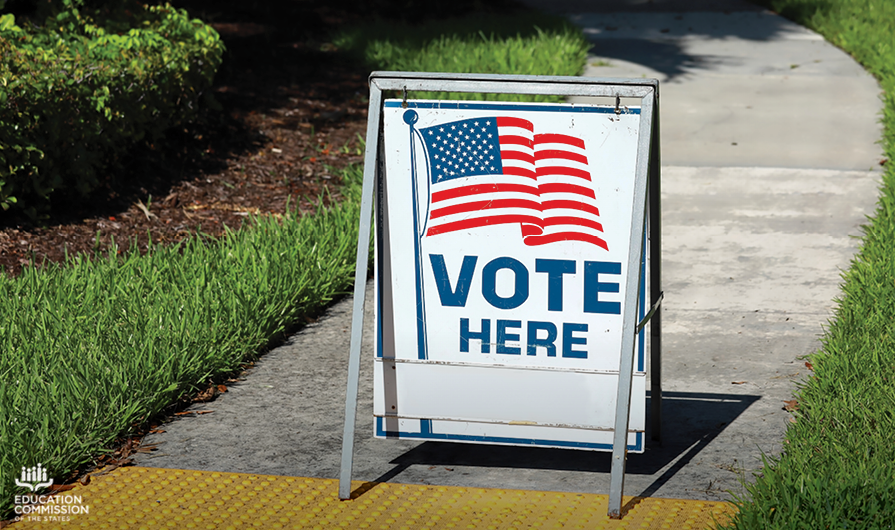With the dust settling on the 2022 election season, Education Commission of the States is here to analyze the state results. Races for governor, chief state school officers, state boards of education and legislative control, as well as several education-related ballot initiatives are set to shape the landscape of state education policy in the coming months and beyond.
Gubernatorial Elections and Appointing Authority
Thirty-six states held gubernatorial elections with incumbents on the ballot in 28 of those states. Twenty-seven of those incumbent governors held on to their offices, and only Nevada’s Steve Sisolak conceded to a challenger, Republican Joe Lombardo. Governor-elect Lombardo will take office in January with a number of education-related authorities, including the power to appoint Nevada’s superintendent of education and seven members (three voting and four nonvoting) to the state board of education.
Eight states were without an incumbent in the governor’s race because of term limits or the incumbent deciding not to run. Josh Green in Hawaii, Tina Kotek in Oregon and Josh Shapiro in Pennsylvania held onto the governor’s seat for Democrats in their states, while their party also flipped three previously held Republican seats through wins from Katie Hobbs in Arizona, Wes Moore in Maryland and Maura Healey in Massachusetts. Republicans held onto governors’ offices in Arkansas and Nebraska with wins from Sarah Huckabee Sanders and Jim Pillen.
For information about policy trends in gubernatorial platforms and the platforms of new governor-elects, check out this blog post.
Governors also have significant power in appointing individuals to key education policy positions. In Oregon and Pennsylvania, the incoming governors have the authority to appoint new chief state school officers. In Massachusetts, Governor-elect Maura Healey has the authority to appoint a secretary of education, a cabinet-level position with significant authority of its own. In Arkansas, Governor-elect Huckabee Sanders has confirmation authority over the individual selected by the state board to serve as chief state school officer.
Chief State School Officers
Seven states also held direct elections for their chief state school officers. In California and Georgia, the incumbents on the ballot held onto their seats — Tony Thurmond (NP) and Richard Woods (R), respectively. In Arizona, however, incumbent chief Kathy Hoffman (D) has conceded the race to Tom Horne (R), the former state attorney general who also served as Arizona’s chief from 2003 to 2011.
New faces will be taking office elsewhere. In Idaho, Debbie Critchfield (R) won the general election after defeating the current chief, Sherri Ybarra, in the primary; similarly; in Wyoming, Megan Degenfelder (R) defeated the incumbent chief, Brian Schroeder (R), in the primary. In Oklahoma and South Carolina, Ryan Walters and Ellen Weaver, both Republicans, will lead their state departments come January.
State Boards of Education
The incoming governors in Arkansas, Arizona, Hawaii, Maryland, Massachusetts, Oregon and Pennsylvania each have the authority to appoint at least some members to their state board of education. This will likely result in new members of these state boards — particularly in states where there was a change in party control.
Beyond that, eight states and the District of Columbia held direct elections for a total of 51 seats on state boards of education. At least 27 of these seats went to new members, which means that half of the incoming class of elected state board members are new to the role:
- Alabama — Four of nine seats up for election resulted in three incumbents and one new member.
- Colorado — Four of nine seats resulted in two incumbents and two new members.
- Kansas — Five of 10 seats resulted in two incumbents and three new members.
- Michigan — Two of eight seats resulted in one incumbent and one new member.
- Nebraska — Four of eight seats resulted in two incumbents and two new members.
- Ohio — Five of 11 seats resulted in two incumbents and three new members.
- Texas — Fifteen of 15 seats resulted in nine incumbents and six new members.
- Utah — Eight of 15 seats resulted in three incumbents and five new members.
- Washington, D.C. — Four of nine seats resulted in four new members.
Legislative Elections
Eighty-eight of the 99 legislative chambers in 46 states held elections in November. Democrats narrowed the national split by picking up the Michigan House and Senate, the Minnesota Senate and the Pennsylvania House. Though the control of the Alaska House has not yet been called, with those gains, Democrats control 40 chambers to Republicans’ 57. Nebraska’s Legislature is, of course, unicameral and nonpartisan.
Even without significant changes in the control of legislative chambers, we’re still likely to see considerable turnover in education committee chairs around the country. We identified at least 151 education-related standing committees around the country. Chairs of at least 35 of those committees will not be returning in 2023, for one of many reasons, including retirement, redistricting, primary defeats or term limits.
In addition to those individuals, at least one chair did not win their general election race. This means that we can expect new committee leadership in nearly one-quarter of those education-related standing committees, even before legislative leadership makes committee appointments in many states.
Ballot Measures
In addition to state education leadership changes, we also tracked education-related ballot initiatives, identifying seven such measures in six states.
Passed
- Arizona — Proposition 308 allows noncitizen students who attended and graduated from an Arizona high school to receive in-state tuition at any university under the jurisdiction of the Arizona Board of Regents or at community colleges.
- California — Proposition 28 increases arts and music education funding. The increased amount is one-half of 1% of the state’s mandatory education spending, an estimated$1 billion annually.
- Colorado — Proposition FF creates the Healthy School Meals for All program to reimburse school food authorities to provide free meals to all students, fund increased employee wages, and provide assistance through local purchasing technical assistance and education grants. The measure changes the cap on state income tax itemized deductions and requires all to be appropriated to fund the program.
- Massachusetts — Question 1 provides resources for public education and public colleges and universities, among other things. Funds for the resources would be provided through a 4% increase to taxable income in excess of $1 million.
- New Mexico— Constitutional Amendment 1 allocates 1.25% of the five-year average of the year-end market value of the land grant permanent funds to be distributed for enhanced instruction for early childhood education and students at risk of academic failure, extending the school year and public school teacher compensation.
- New Mexico — Bond Question 3 authorizes the issuance of an obligation bond not to exceed $215,986,000 for higher education, special schools and tribal schools capital improvements and acquisitions. The measure establishes a general property tax imposition and levy to pay for the principal, interest and expenses of the bond.
Failed
- West Virginia— Amendment No. 4 would have made the policymaking and rule-making authority of the state board of education subject to legislative review, approval, amendment or rejection.
With these leadership and ballot changes, we’re likely to see impacts to education policy across states. As always, we’ll be sure to keep you updated with the information you need to make the best education decisions for your state.











